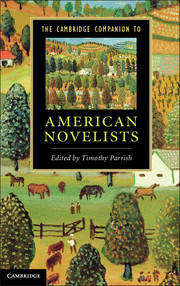Book contents
- Frontmatter
- Contents
- Contributors
- Introduction
- 1 James Fenimore Cooper
- 2 Nathaniel Hawthorne
- 3 Herman Melville
- 4 Harriet Beecher Stowe
- 5 Mark Twain
- 6 Henry James
- 7 Edith Wharton
- 8 Theodore Dreiser
- 9 Willa Cather
- 10 F. Scott Fitzgerald
- 11 Ernest Hemingway
- 12 William Faulkner
- 13 Henry Roth
- 14 Djuna Barnes
- 15 Zora Neale Hurston
- 16 Richard Wright
- 17 Raymond Chandler
- 18 Ralph Ellison
- 19 J. D. Salinger
- 20 Patricia Highsmith
- 21 Vladimir Nabokov
- 22 Jack Kerouac
- 23 Saul Bellow
- 24 Kurt Vonnegut
- 25 John Updike
- 26 Thomas Pynchon
- 27 Toni Morrison
- 28 Philip Roth
- 29 Don DeLillo
- 30 Cormac McCarthy
- Guide to Further Reading
- Index
- References
23 - Saul Bellow
Published online by Cambridge University Press: 05 December 2012
- Frontmatter
- Contents
- Contributors
- Introduction
- 1 James Fenimore Cooper
- 2 Nathaniel Hawthorne
- 3 Herman Melville
- 4 Harriet Beecher Stowe
- 5 Mark Twain
- 6 Henry James
- 7 Edith Wharton
- 8 Theodore Dreiser
- 9 Willa Cather
- 10 F. Scott Fitzgerald
- 11 Ernest Hemingway
- 12 William Faulkner
- 13 Henry Roth
- 14 Djuna Barnes
- 15 Zora Neale Hurston
- 16 Richard Wright
- 17 Raymond Chandler
- 18 Ralph Ellison
- 19 J. D. Salinger
- 20 Patricia Highsmith
- 21 Vladimir Nabokov
- 22 Jack Kerouac
- 23 Saul Bellow
- 24 Kurt Vonnegut
- 25 John Updike
- 26 Thomas Pynchon
- 27 Toni Morrison
- 28 Philip Roth
- 29 Don DeLillo
- 30 Cormac McCarthy
- Guide to Further Reading
- Index
- References
Summary
When Saul Bellow’s (1915–2005) Artur Sammler, Holocaust survivor, transplanted “refugee in Manhattan,” wonders, “Is our species crazy?” he can only reply, with the absolute conviction born of experience and observation: “Plenty of evidence.” Artur Sammler, the protagonist of Bellow’s novel Mr. Sammler’s Planet, published serially in 1969 in the Atlantic Monthly and in book form in 1970, is a man betrayed by history. He is a Jew who barely escaped the Holocaust with only one good eye, the other “struck … by a gun butt and blinded” (SP 137). He is a man who, condemned to die, “clawed his way out” of the mass grave that he was forced to dig, emerging while his wife and others “had been buried alive” (SP 273). Having dug his way, “inside death,” Sammler inexplicably resurfaces, literally scrambling from the grave that was not yet to be his (SP 273). And then, with the eventuality of inexorable oddity, by way of a displaced persons (DP) camp in Salzburg, the bewildered Sammler, resurrected from the grave, finds himself reassigned to America, “advertised throughout the universe as the most desirable, most exemplary of all nations” (SP 14). It is here in America that, far from the European nightmare of Sammler’s ever-receding past, the unimaginable might finally be imagined. Having thus survived, Sammler finds himself in America in the midst of a century that has seen, in Bellow’s own words, “a crime so vast that it brings all Being into Judgment.” And Sammler, “separated from the rest of his species, if not in some fashion severed,” must come to grips with his reconstructed life, must attempt to reinvent himself by negotiating “the charm, the ebullient glamour, the almost unbearable agitation that came from being able to describe oneself as a twentieth-century American” (SP 43, 73).
- Type
- Chapter
- Information
- The Cambridge Companion to American Novelists , pp. 230 - 240Publisher: Cambridge University PressPrint publication year: 2012
References
- 4
- Cited by



